| Srl | Item |
| 1 |
ID:
095195
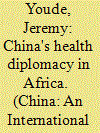

|
|
|
| 2 |
ID:
095196
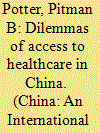

|
|
|
| 3 |
ID:
095194


|
|
|
| 4 |
ID:
095193
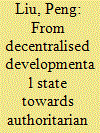

|
|
|
|
|
| Publication |
2010.
|
| Summary/Abstract |
This paper attempts to answer three questions about the contemporary Chinese drug safety regulation system: why did the Chinese government reform its drug safety monitoring system and build a regulatory regime at the end of the 1990s? What obstacles will it face? What unique characteristics does it possess? Was it the collapse of the Interest Community of Government, Enterprise and Shiye Unit (ICGES) that fostered the rise of the regulatory regime in contemporary China's drug safety monitoring field? Three major structural obstacles threaten the building of a high-quality regulatory regime: problematic regulatory independence caused by decentralised developmentalism, an administration-reliant regulatory style and rent-seeking corruption brought about by the authoritarian political system. The author is inclined to characterise the current Chinese drug safety regulatory regime as an "authoritarian regulatory state" and argues that Chinese drug safety regulatory regime-building is still a work in progress.
|
|
|
|
|
|
|
|
|
|
|
|
|
|
|
|
| 5 |
ID:
095190
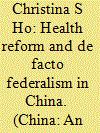

|
|
|
|
|
| Publication |
2010.
|
| Summary/Abstract |
Understanding China as a de facto federalism can generate explanations and recommendations concerning the path of China's health reform. The first section reviews how de facto federalism drove the historical development of the problems plaguing China's health system. The next section shows how certain features of the current reform plan, namely, the plan's ambivalence between government and market approaches and its lack of strong centralisation, can be explained by de facto federalism. The third section uses the hypothesis of de facto federalism to generate two courses of action - one cautionary; the other, aspirational - that could be considered for the future. The consequences for the health sector of under-articulated federalism are clarified and point to the need for discursive reasoned elaboration, as opposed to political bargaining alone, in federalism.
|
|
|
|
|
|
|
|
|
|
|
|
|
|
|
|
| 6 |
ID:
095189


|
|
|
|
|
| Publication |
2010.
|
| Summary/Abstract |
China's post-1978 market reforms were accompanied by a drastic decline in the coverage of the Chinese population by medical insurance as well as by sharp increases in charges for medical treatments, tests, and prescriptions. Since the 1990s, these trends have produced widespread condemnation of the current Chinese medical care system for being too costly and unequal. This article attempts to answer two questions:
1) Why did changes in the healthcare system precipitated by market reforms not lead to the kind of deterioration in the health of Chinese citizens that market reforms produced in Eastern Europe and the former Soviet Union?
2) In view of the increased inequalities in access to, and insurance coverage for, medical care since 1978, and particularly the growing rural-urban gap, why do Chinese villagers and migrants rate their current health better than do urban citizens?
|
|
|
|
|
|
|
|
|
|
|
|
|
|
|
|
| 7 |
ID:
095192
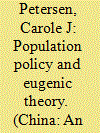

|
|
|
|
|
| Publication |
2010.
|
| Summary/Abstract |
The Convention on the Rights of Persons with Disabilities (CRPD) is the first new human rights treaty of the 21st century. China was an early supporter of the CRPD and became East Asia's first State Party in 2008. This article discusses how the CRPD protects the rights of persons with disabilities to life, marriage and procreation, and analyses China's population policy, which continues to reflect eugenic theories. As China did not file any reservations, it is now obligated to reform laws and policies that conflict with the CRPD.
|
|
|
|
|
|
|
|
|
|
|
|
|
|
|
|
| 8 |
ID:
095191
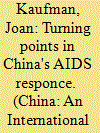

|
|
|
|
|
| Publication |
2010.
|
| Summary/Abstract |
China's AIDS response has evolved from one of denial and inaction to an aggressive and humanitarian policy based on international best practices. This article analyzes the events both internal and external that led to the policy shifts, highlighting key turning points in attitudes and action. A combination of domestic advocacy, international pressure, changing epidemic dynamics and fall-out from the SARS epidemic coaxed the government to greater transparency and deliberate action on prevention and treatment. However, a number of important challenges remain which will influence the ultimate success of China's much improved AIDS response.
|
|
|
|
|
|
|
|
|
|
|
|
|
|
|
|